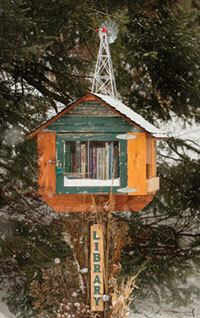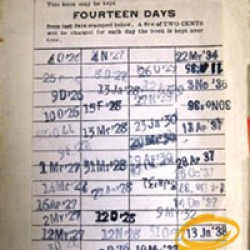Little Libraries

A Little Free Library at the corner of Blackhawk Avenue and Regent Street in Madison sports a miniature windmill. Photo: Andy Manis.
For the last year or so, I’ve noticed what look like overgrown mailboxes with books inside popping up around Madison. It took a while for them to break through all the competing distractions of busy days, until I got curious enough to take a look inside. Then I learned that this wasn’t just a Madison phenomenon — these Little Free Libraries, a neighborly means of exchanging books, are actually sprouting all over the world. And the global phenomenon was started by the university’s own Rick Brooks (of the Division of Continuing Studies) and his friend Todd Bol. Neither had any idea that this simple concept would take off the way it did.
But, as writer Erika Janik points out in this issue, there is something so charming about the homemade book houses that many people find them hard to resist. This past summer, I made daily rounds in my neighborhood, where there are three within blocks, and discovered a book called Mrs. Whaley’s Charleston Garden. Serendipitously, I was just about to visit family in Charleston, South Carolina. So while I was there, we visited this delightful, free garden tucked away on the city’s historic Church Street. We’d never have found it otherwise.
A copy of In a Sunburned Country, Bill Bryson’s entertaining travelogue of Australia, became my beach reading, and after my return, I snapped up a brand new copy of Born to Run: A Hidden Tribe, Superathletes, and the Greatest Race the World Has Never Seen by Christopher McDougall, which I had been planning to buy. This was a bonus day that also yielded Christian Lander’s Stuff White People Like, which has provided a hilarious window into American culture for my Thai student boarder.
Since thinning my own book collection was on my to-do list, I placed a dozen titles in various little libraries, and found that speculating about who might read them was just as satisfying as scouting for my own reads. One selection was The Fluoride Deception by former BBC reporter Christopher Bryson. I checked regularly to see if someone had taken it, but after four weeks, it was still there.
Maybe I should move it to another free library. I just know that someone will read it!
Published in the Winter 2012 issue


Comments
No comments posted yet.